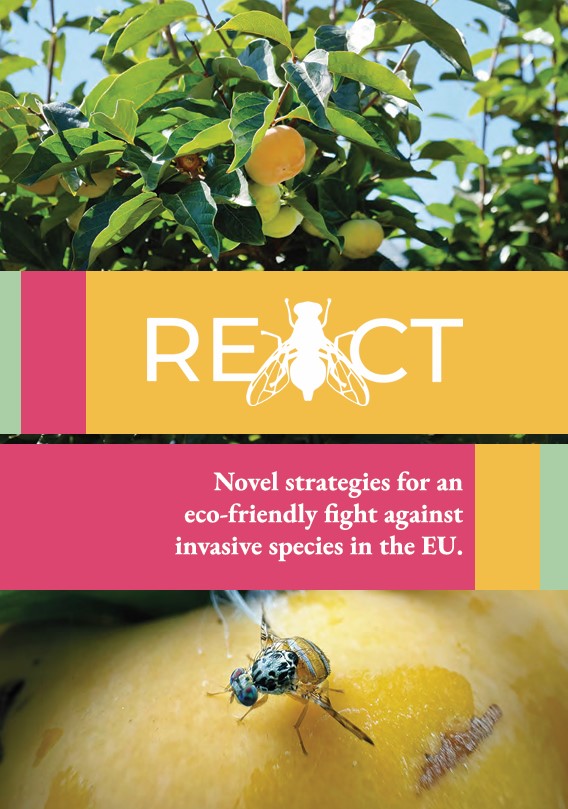REACT draws upon experience
from South Africa
REACT aims to develop long-term environmentally friendly response strategies and novel sustainable tools to protect fruit and vegetable production and export capacities from two invasive insect fruit fly pests – Bactrocera dorsalis (Bd) and Bactrocera zonata (Bz) which are of concern to both South Africa and EU.
Bactrocera dorsalis was declared established in the northern parts of South Africa in 2013 and currently still has a restricted distribution in the country. In South Africa, the pest is present in the north and north-eastern areas and there are areas in the south and west which are free of it. Bactrocera zonata is absent from South Africa. However, its presence of the northern parts of the African continent and Indian Ocean islands presents a direct threat. Bactrocera zonata is therefore of biosecurity concern in South Africa.
REACT het ten doel om langtermyn, omgewingsvriendelike reaksie-strategieë en nuwe volhoubare hulpmiddels te ontwikkel om vrugte- en groenteproduksie en die vermoë om uit te voer, teen twee indringer-vrugtevliegplae – Bactrocera dorsalis (Bd) en Bactrocera zonata (Bz), wat beide kommerwekkend vir Suid-Afrika en die EU is, te beskerm.
Bactrocera dorsalis het in 2013 in die noordelike dele van Suid-Afrika gevestig en het steeds ‘n beperkte verspreiding in die land. In Suid-Afrika kom die plaag in die noorde en noord-oostelike gebiede voor en daar is gebiede in die suide en weste wat vry van die plaag is. Bactrocera zonata kom nie in Suid-Afrika voor nie. Die plaag se teenwoordigheid in van die noordelike dele van die Afrika-kontinent en die Indiese Oseaan eilande hou egter ‘n direkte bedreiging in. Bactrocera zonata is dus van biosekuriteitsbelang vir Suid-Afrika.
REACT is one of the projects of the EU’s Farm to Fork strategy for a transition to fair, healthy and resilient agriculture and forestry. Citrus Research International (Pty) Ltd (CRI) is one of the partners in South Africa. In South Africa, CRI will be assessing the economic and environmental impacts of fruit fly pests including the invasive B. dorsalis and benefits of Sterile Insect Technique (SIT) in the management of fruit fly pests.
Stakeholders in the fruit industries will be consulted via questionnaire surveys, interviews and workshops to obtain information on economic and environmental impacts of fruit fly pests, acceptance of the SIT technology for fruit fly management and the benefits of inclusion of SIT in fruit fly management. A cost and benefit analysis will be carried out on fruit fly management strategies including SIT-based ones.
REACT is een van die projekte van die EU’s Farm to Fork strategie vir ‘n oorgang na regverdige, gesonde en veerkragtige landbou en bosbou. Citrus Research International (Pty) Ltd (CRI) is een van die vennote in Suid-Afrika. In Suid-Afrika sal CRI die ekonomiese en omgewingsimpakte van vrugtevliegplae evalueer, insluitend die indringer B. dorsalis, en voordele van Steriele Insektegniek (SIT) in die bestuur van vrugtevliegplae.
Belanghebbendes in die vrugtebedrywe sal geraadpleeg word deur middel van vraelys-opnames, onderhoude en werkswinkels, om inligting te bekom oor ekonomiese en omgewingsimpakte van vrugtevliegplae, aanvaarding van die SIT-tegnologie vir vrugtevliegbestuur, en die voordele van die insluiting van SIT in vrugtevliegbestuur. ‘n Koste-voordeel-analise sal op vrugtevliegbestuurstrategieë, insluitend SIT- gebaseerde strategieë, gedoen word.
Workshops:
Wednesday 26 June 2024
Stakeholders’ workshop on the development of a framework for management strategies for invasive exotic fruit fly pests
Our partner:




